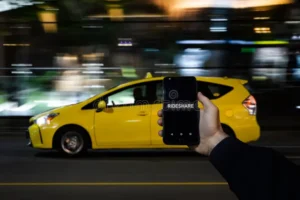Ocala FL Rideshare Lawyer
 Uber and Lyft services have changed Ocala residents’ commutes, medical appointments, or fun nights out significantly. When these trips end in crashes, however, victims quickly learn they differ legally from ordinary car wrecks in terms of legal complexity. Multiple insurance layers, app-status period, and changing Florida statutes can turn what looked like a simple collision into an intricate web of corporate policies and state regulations that require professional guidance to navigate successfully. Pam Olsen, a qualified Ocala FL rideshare lawyer can provide expert assistance untangling that web and fighting to secure compensation on your behalf for injuries suffered during such collisions in Ocala, FL, Rideshare Collisions!
Uber and Lyft services have changed Ocala residents’ commutes, medical appointments, or fun nights out significantly. When these trips end in crashes, however, victims quickly learn they differ legally from ordinary car wrecks in terms of legal complexity. Multiple insurance layers, app-status period, and changing Florida statutes can turn what looked like a simple collision into an intricate web of corporate policies and state regulations that require professional guidance to navigate successfully. Pam Olsen, a qualified Ocala FL rideshare lawyer can provide expert assistance untangling that web and fighting to secure compensation on your behalf for injuries suffered during such collisions in Ocala, FL, Rideshare Collisions!
Reach out to us now or Call Pam Olsen now at (352) 671-9777 for a free consultation and let us fight for you.
Why Is Liability Complicated in Rideshare Crashes
Traditional car accidents typically involve two individuals with their respective personal insurance policies involved. For ridesharing accidents, however, liability could extend further. Such accidents could include:
- Personal insurance will cover any rideshare drivers operating their personal rideshare business.
- Commercial insurer for a rideshare company.
- At-fault motorists (e.g., brake failure).
- Municipal entities (e.g., designing hazardous roads)
As each insurer will attempt to shift blame to reduce payouts. Determining which coverage kicks in immediately following an accident is essential in Florida courts. Florida judges focus heavily on investigating driver app status, as this detail could determine if compensation starts at $10,000 or soars into millions.
The Three Rideshare Insurance Periods
Florida and most other states divide a rideshare driver’s activity into three coverage periods, known as segments.
- App Off (Period 0): In App Off mode, drivers are no longer subject to company policy but instead follow only their individual ones.
- App On, No Passenger (Period 1): Drivers have their apps open. Still, no passenger is present, in compliance with Florida state law, Uber and Lyft must provide at least $50,000 bodily injury per person injured and $100,000 total accident coverage as well as $25,000 of property damage coverage during this time frame.
- Periods 2 & 3 (En-Route or Passenger On Board): From acceptance of a trip until drop-off, rideshare company policies providing $1 Million commercial liability protection remain in force.
Reconciling every second with electronic logs, GPS pings, and phone metadata often determines which insurer must pay. Speak with an Ocala FL rideshare lawyer to understand better.
Florida’s New Legal Landscape after HB 837
In 2023, the Florida legislature passed House Bill 837 (Civil Remedies Reform), shortening the statute of limitations for negligence actions from four years to two and adopting a modified comparative negligence rule. If more than 50% blame lies with any one party involved, then recovery cannot proceed.
These changes mean rideshare victims now have less time and must defend against assertions that their negligence caused the crash, rather than distracted drivers or ridesharing services. An Ocala FL rideshare lawyer monitoring such updates could file in time before deadlines pass and accumulate evidence proving below 50 % fault on behalf of their client.
Who Is Liable for Rideshare Misconduct?
1. The Driver
If a driver was speeding, texting while driving, or impaired during their shift, their negligence becomes the cause. After policy limits have been exhausted, in particularly catastrophic instances, personal assets could become exposed as liability shifts back onto them.
2. The Rideshare Company
Uber and Lyft use independent contractors as drivers in order to minimize exposure. However, Florida’s Transportation Network Company (TNC) statute still mandates they maintain substantial insurance and conduct reasonable screening processes when selecting drivers. Failure to deactivate those arrested for DUI could give rise to claims for negligent hiring and retention practices.
3. Third-Party Motorists
Unfortunately, accidents sometimes involve another motorist who causes no fault of their own and causes severe damages that exceed rideshare coverage limits. Victims in such instances should pursue that motorist’s insurer first before tapping rideshare coverage if damages surpass limits.
4. Manufacturers and Municipalities
Defective airbags or traffic signals that fail can extend liability beyond just two drivers. Multi-party lawsuits often arise under HB 837 deadlines for filing claims.
5. Bad‑Faith Actors
Recent headlines about insurance-fraud rings staging rideshare crashes in Florida provide another dimension. Insurers may accuse plaintiffs of insurance fraud while ridesharing companies sue conspirators, complicating legitimate claims further.
Key Evidence in a Rideshare Claim
- Electronic Ride Data: Timestamped logs provide evidence of app status and vehicle speed.
- Vehicle Telemetry: Uber often carries dashcams or other vehicle tracking devices for additional protection against potential dangers in their journeys.
- Phone Records: Can demonstrate driver distraction or confirm availability.
- Company Policies: Internal emails concerning safety or quotas could expose potentially negligent corporate practices.
- Medical Documentation: Prompt exams to link injuries with their source are integral for no-fault PIP coverage as well as passing Florida’s “serious injury threshold”.
Preserving evidence requires immediate action. Rideshare companies have the capability of purging logs within months, and House Bill 837 restricts discovery extensions. Speak with an Ocala FL rideshare lawyer immediately.
What to Do in Case of Rideshare Crashes
- First and foremost, call 911 immediately and request police and emergency medical services assistance.
- Document Everything: Photos, driver details, and witness contact numbers.
- Seek medical treatment within 14 days to preserve PIP benefits.
- Report through the app without including detailed statements.
- Consult an Ocala FL rideshare lawyer before speaking with any insurance carrier or their agents.
Pam Olsen’s office can quickly dispatch investigators, issue preservation letters, and begin determining future medical needs while you focus on recovery.
Why Choose Pam Olsen?
- Pam has extensive expertise litigating Uber and Lyft collisions as well as taxi crashes over decades of practice.
- Resource Depth: She has access to accident reconstruction engineers and telephone forensic experts.
- Trial Readiness: Insurers often look out for lawyers willing to try cases themselves, as those willing can secure higher settlements than their colleagues who don’t take such initiatives.
- Contingency Fees: There will be no upfront payments required until compensation has been earned by your case.
Reach out to us now or Call Pam Olsen now at (352) 671-9777 for a free consultation and let us fight for you.
Frequently Asked Questions: Ocala FL Rideshare Lawyer Services
Q: Am I Covered If an Uber Driver’s Personal Insurer Denies My Claim?
Ans: Yes. Once they log into their Uber application for Periods 1-3 (Periods 1 through 3), the TNC policy of Uber or Lyft takes over, even if their personal insurer rejects. Speak with an Ocala FL rideshare lawyer.
Q: What happens if an off-duty rideshare driver hits me?
Ans: When the app was not active, only their personal policy applied, and you may sue directly against them should damages exceed those outlined within.
Q: When can I file a lawsuit in Florida?
Ans: For negligence-based lawsuits, two years is generally allowed from the date of impact for filing suit in court. Speak with an Ocala FL rideshare lawyer.
Q: Does PIP still pay first?
Ans: Yes. Florida’s no-fault system mandates that your own PIP pays initial medical costs up to $10,000 regardless of who’s responsible. More serious injuries allow for further action to be taken against at-fault parties.
Q: Can I Still Recover If I Didn’t Wear My Seat Belt?
Ans: Potentially. Failure to buckle up may reduce damages under comparative negligence, but will not automatically bar recovery until fault exceeds 50%.
Q: What happens if Uber’s insurer accuses me of staging the accident?
Ans: Insurance providers frequently point to recent fraud cases to deny claims. An Ocala FL rideshare lawyer can immediately assist with gathering neutral evidence, such as dashcam footage or witness affidavits, to counter these accusations and defend against further accusations of staging.
Q: Can I Sue Uber or Lyft Directly?
Ans: Most often you must file against both your Uber driver and company insurer separately, although in cases involving corporate negligence directly against Uber or Lyft may proceed directly against them.
Q: What Is My Rideshare Case Worth?
Ans: Settlement amounts typically depend upon medical costs, lost earnings, pain and suffering damages, as well as future care needs. Pam Olsen provides comprehensive evaluation services, which include vocational experts as well as life care planners, to evaluate each rideshare case thoroughly.
Conclusion
Rideshare crashes combine cutting-edge technologies with corporate policy decisions and ever-evolving Florida law, so determining who is liable requires swift evidence preservation efforts by an advocate knowledgeable of both road rules and courtroom proceedings. Contact Pam Olsen, an Ocala FL rideshare lawyer, and get experienced and compassionate representation.
Reach out to us now or Call Pam Olsen now at (352) 671-9777 for a free consultation and let us fight for you.
